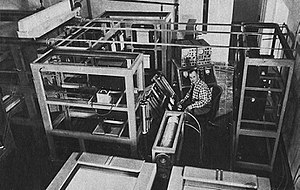
The Huemul Project (Spanish: Proyecto Huemul) was an early 1950s Argentine effort to develop a fusion power device known as the Thermotron. The concept was invented by Austrian scientist Ronald Richter, who claimed to have a design that would produce effectively unlimited power.
Richter was able to pitch the idea to President of Argentina Juan Perón in 1948, and soon received massive funding to build an experimental site on Huemul Island, on a lake just outside the town of San Carlos de Bariloche in Patagonia, near the Andes mountains. Construction began late in 1949, and by 1951 the site was completed and carrying out tests. On 16 February 1951, Richter measured high temperatures that suggested fusion had been achieved. On 24 March, the day before an important international meeting of the leaders of the Americas, Perón publicly announced that Richter had been successful, adding that in the future energy would be sold in packages the size of a milk bottle.[1]
A worldwide interest followed, along with significant skepticism on the part of other physicists. Little information was forthcoming: no papers were published on the topic, and over the next year a number of reporters visited the site but were denied access to the buildings. After increasing pressure, Perón arranged for a team to investigate Richter's claims and return individual reports, all of which were negative. A review of these reports was equally negative, and the project was ended in 1952. By this time, the optimism of the earlier news had inspired groups around the world to begin their own research in nuclear fusion.
Perón was overthrown in 1955, and in the aftermath, Richter was arrested for fraud. He appears to have spent periods of time abroad, including some time in Libya. Eventually he returned to Argentina, where he died in 1991.[2]
- ^ Newton 1992, p. 379.
- ^ "Richter: De La Fusion Nuclear Al Olvido". Microsemanario. 2 (43). Secretaría de Extensión Universitaria de la Facultad de Ciencias Exactas y Naturales – UBA. November–December 1991.